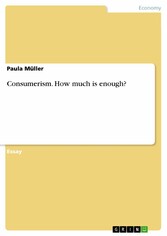Suchen und Finden
Consumerism. How much is enough?
Essay from the year 2014 in the subject Business economics - Business Ethics, Corporate Ethics, grade: 2,3, University of Applied Sciences Dresden, language: English, abstract: Day for day, we are faced with advertisement telling us what we need in order to be happy. And even if you are already content with your life there is always a way to achieve even more happiness. 'Think big' as IMAX says; 'Nothing is impossible' according to Adidas; 'Live better' with Walmart; 'Just do it' for Nike; Visit Disneyland, 'the happiest place on earth'; Buy 'beauty, power and soul' in an Aston Martin; 'Live' with IKEA and 'open happiness' with Coca Cola. You require material goods for everything these days: Rolex and Porsche for success, an Apple or Samsung smartphone for friendship and further communication etc. And whenever there is a new model or edition of a product with improved features it must improve your satisfaction, as well, right? Nonetheless, the people in the big industrial nations who can afford to buy so many goods are not necessarily happier. According to the 'Happy Planet Index', which measures the human well-being, the USA is for instance as unhappy as the majority of African States. In Europe there are only three countries achieving the third lowest index, Ukraine, Romania and Moldova. All the other states are even below that rate. Therefore, the happiest countries are mainly South Americans. It can be argued if this index is reliable, if the methods are appropriate or whether happiness can be measured in the first place. But looking at other studies as well, the researchers seem to generally agree that the people's happiness is not necessarily related to the level of consumption and the economic wealth.
Alle Preise verstehen sich inklusive der gesetzlichen MwSt.








